
Italy: tel (+39) 347 4764798
e-mail:

Italy:
tel (+39) 347 4764798
e-mail: ![]()
Gallery 1 : Russian Icons
Click on Picture for larger Image
|
Nr.P1 |
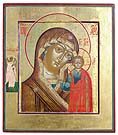 Extra Large Image 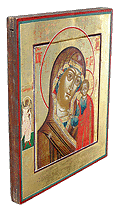 Lateral Image  Angel Protector 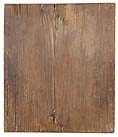 Wood Back Image  Bedroom Decoration |
Old Icon Kazan Mother of God -
Yaroslavl School late 18th Century 1780/1800 circa -
Handpainted with egg tempera on Gold leaf over wood panel -
Mother of God with Child - On the left the protector Angel - The Kazan icon is related to the iconographical
type of hymn in praise of the Virgin, known as
the Odigitry icon ( from Greek it means "guide")
This icon
depicts the Virgin in half-.length with the
blessing God-Child. In Byzantium, this iconography
was related to the Vlakherin icon of the Virgin.
In Russia, the icon was named after Kazan,
the place of a miraculous occurrence on July 8, 1579.
Prince Dmitry Pozharsky freed Moscow holding
the Kazan icon of the Virgin on October 22, 1612.
The church celebration of the icon occurs on these
two days -
The Virgin of Kazan was considered the
protectress of all Russia.
Icon made in old russian traditions of 18th century - Kovcheg (raised border) -
Icon is painted with ochre, red, green and in various tones.
Good state of preservation with some old restoration
- Size: cm 30 x 34,5 (12" x 13½" inches)
-
Payment: Bank Money transfer or International Postal Order 
Click to see bigger image 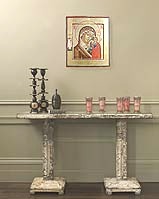
Click to see bigger image 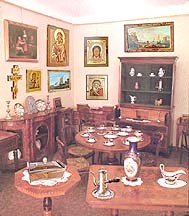
Click to see bigger image
Bigger Images are visible here: |
Age: |
Price: |
|
Size: cm 30 x 34,5 |
|
Nr.P2 |
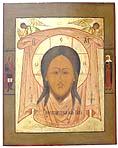
Extra Large Photo 
 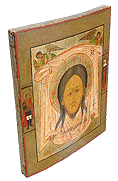 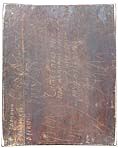 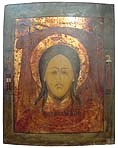 Before cleaning 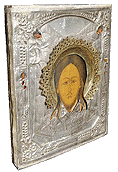 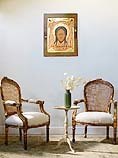
|
Old Rare Mandylion Icon
in the Superb original version of the russian iconography
- St. Petersburg School late 18th Century 1770/1790 circa -
Very rare and interesting painting on Gild leaf applied over wood panel -
There are the Archangels Michael and Gabriel holding the Mandylion cloth -
On the lateral borders the two figures of the Home Saint protectors: 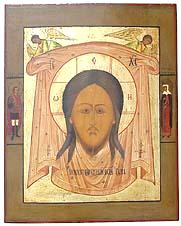 Click to see bigger image 
This icon is also known as "The Sudarium" or Savior
Uncreated by Human Hands (Nerukotvorny Obraz Gospoda Nashego
Isusa Khrista ) - The depiction is inspired
by a legend that Christ’s image remained on a cloth
that He used to wipe His face. Abgar, The King
of Edessa, was suffering from leprosy. Hearing of
the many miracles performed by Jesus Christ, the King sent his archivist
Hannan to look for Jesus to heal him.
As Jesus couldn't come, Hannan tried
to draw him but with no success "because
of the inexpressible glory in his face
which changed in grace."
So Christ got a cloth himself and put
it on his face and his visage were
impressed on the Mandylion 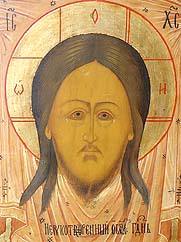 Click to see bigger image As soon as the King saw the Jesus face impressed on the Mandylion, he was healed and became converted. Later the king attached this cloth to a board and placed it on a niche on the gate of the city. Tile was then used as a covering for the cloth and legend says that the image appeared on the tile as well. In the russian iconography of the late 16th and 17th centuries, the painted figures of the Archangels Michael and Gabriel appeared holding up the Mandylion cloth. 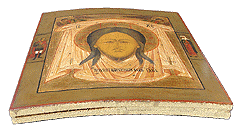 Click to see bigger image
Icon in good condition of conservation - Only a cleaning restoration was made recently - 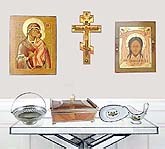 Click to see bigger image 
Click to see bigger image
Bigger Images are visible here: |
Age: |
Price: |
|
Size: cm 36 x 44,5 |
|
Nr.P3 |
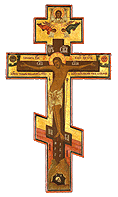  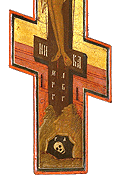  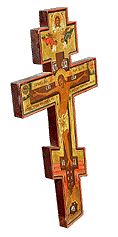 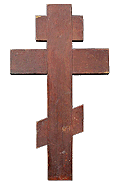 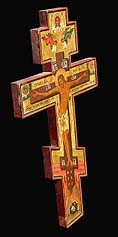 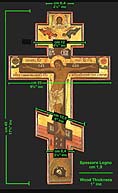 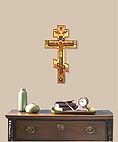 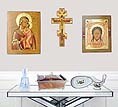 |
Superb old Icon "Crucifixion of Our Lord Jesus
Christ" - The upper part of the Crucifix includes an image of
the Mandylion and two hovered angels with veiled hands bow to receive the
soul of the Crucified
- Palekh School - Period early 19th century
- 1800/1830 circa - Icon painted on Gold leaf
applied on wood panel in the typical form of an orthodox cross -
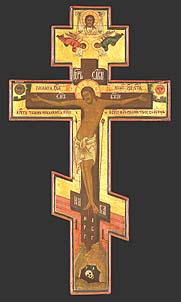
Click to see Extra Large image
This type of composition makes the icon extremely rare to find -
Hand painted with egg tempera over wood panel -
The shape of the Cross is called - "eight-pointed', i.e.
one vertical and three horizontal beams:
the first upper part is for the classic latin sentence title INRI, but in this case the cyrillic white inscription says: 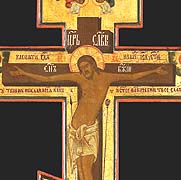
Click to see Extra Large image
The third slanting beam on the bottom is the footboard - Near the Christ's feet the inscription "NI KA"
from greek words that means: "He (Jesus) Wins" - Just below the slanting footboard are the 4 cyrillic letters "M L R B"
abbreviating for "Mesto Lobnoe Ray Buist"
which means: "The Place of the Skull Becomes Paradise" - Following the 2 cyrillic letters "GG" abbreviating for "Gora Golgofa"
which stand for "The Hill of Golgotha" - Under this section, just above the skull the cyrillic letters "G A" stand for "Golova Adama"
which means: "The Head (Skull) of Adam" -
In this area are depicted the walls of Jerusalem and the
Golgotha hill on which the Cross is implanted, as stylized rocks -
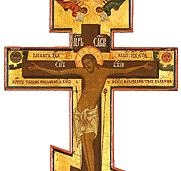
Click to see Extra Large image
The shape of the Cross was adopted from Byzantium,
while the inclination of the lower beam is a purely
Russian development - In Eastern compositions Christ
is crucified by four nails and not by three as in the Western art -
The Savior is pictured dead with closed eyes or alive with open
eyes, depending on the different moments of the Passion -
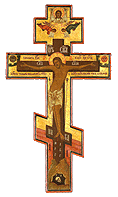
Click to see Extra Large image The cross is cm 45 height (17¾" inches) - The Icon is in good original state of preservation - The hole on the base of the cross is the point of connection for the "U" form processional bracket pole - The metallic support was subsequently sideways fixed with the use of two screws - 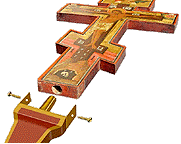
Rebuilt sketch of the processional support
The icon is well painted
in the old russian tradition with bright colours such as
ochre, red and blue/green tonalities -
Size: cm 25 x 45 (9¾" x 17¾" inches)
- 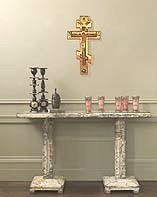
Click the photo to see bigger image 
Click to see bigger image
Provenance: private collection - Tallinn (Estonia) |
Age: early |
Price: |
|
Size: cm 25 x 45 |
|
Nr.P4 |
 Extra Large Photo 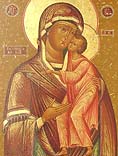 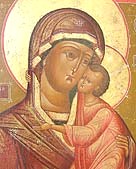 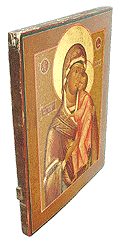 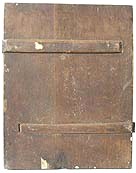 |
Extremely Rare Old Icon "Mother of God of Khlinov" - Novgorod School - middle 18th Century - 1750/1770 circa - Icon of large dimension - Painting on Gold leaf applied over wood panel - This icon, which is unusually rare, derives from the Umilenyie or Tenderness theme, where Mother and Child embrace, "Eleusa" - In all the icons representing the Virgin with child, that one of "Khlinovskaya" is a much rare subject and very difficult to find - 

Khlinovskaya
The prototype of this iconographic type was a 17th Century miraculous icon from the town of Khlynov
(renamed Vyatka in 1781 by Catherine the Great) -
In 1934 the town changed name again in "Kirov", in honor of the revolutionary russian leader Sergey Kirov
- 
Click to see bigger image 
Clicca per vedere la foto 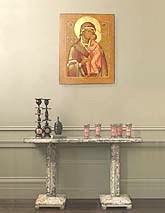
Click to see bigger image 
Click to see bigger image
Bigger Images are visible here: 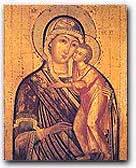 . .
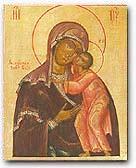
Virgin of Khlinov 17th and 19th Century
|
Age: |
Price: |
|
Size: cm 39 x 49,5 |
|
Nr.P5 |
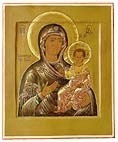 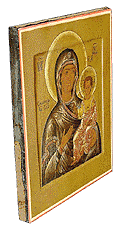 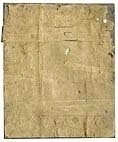 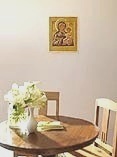 |
Old Russian Icon Virgin of Smolensk -
Novodevichy School (Moscow)- Period early 18th Century
1700/1730 circa - The most stern and solemn variant of the Virgin
Hodegetria - Its chief distinction from an Iconography
point of view is that the Christ-Child is depicted
full face - 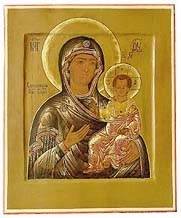

Smolenskaya The legend says it was brought to Russia from Byzantium, was kept from the 12th century in the Assumption Cathedral in the city of Smolensk - In the 15th century the Icon was in Moscow for a time, but in 1465 it was returned to the people of Smolensk - The Virgin of Smolensk became particularly popular in the 16th century - 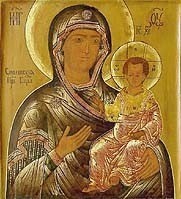
Handpainted with
egg tempera over wood panel - Kovcheg (raised border) -
Very well painted icon with the typical Novodevichy style -
in orignal state of conservation with some old restoration -
On the back, the wood is still covered with an old 18th Century
embroidered canvas to protect the decorations of the wall where the
icon was hanged up -
Size: cm 26 x 31 (10½" x 12½" inches) - 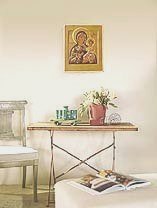
Click to see bigger image 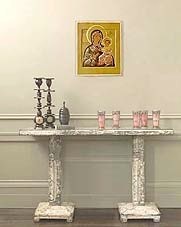
Click to see bigger image 
Click to see bigger image
Bigger Images are visible here: |
Age: |
Price: |
|
Size: cm 26 x 31 |
|
Nr.P6 |
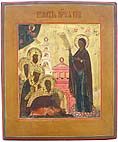 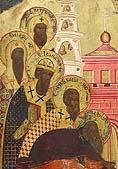 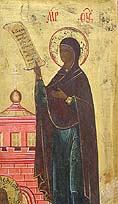 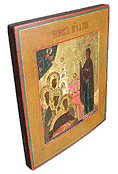 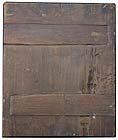  |
Rare Russian Icon of the Bogolubskaya Mother of God - Moscow school, period 1780/1800 circa - Hand painted with egg tempera on Gold leaf. Gesso on wood panel - Very good condition - Architecture on the icon is in 15th century traditions - The appearance of this holy image is closely linked with the life of Russia's greatest miracle-working icon, Vladimir Icon of the Mother of God - 
When in 1157 Prince Andrei Bogolyubsky moved his residence to Suzdal, he decided to take this icon along with him - Having approached Vladimir, the horses suddenly stopped on the bank of the Klyazma River and refused to make another step forward - The amazed Prince spent the night in prayer before the icon - During the prayer the Most Holy Theotokos appeared to him, holding a scroll in Her right hand, and commanded the Prince to take the icon to Vladimir and to build a church and found a cloister at the spot where miraculous event took place - Obeying the heavenly command, Prince Andrei Bogolybksy founded a church dedicated to the Nativity of the Blessed Virgin at the spot and ordered icon-painters to depict the Heavenly Queen as She appeared to him - 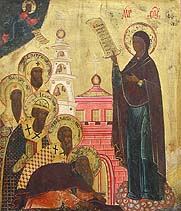
Handpainted with egg tempera on Gold leaf over wood panel - Two splines on back - Kovcheg (raised border) - Very well painted icon with the typical Novodevichy style - In very good state of conservation with small old restoration - Size: cm 26 x 31 (10½" x 12½" inches) -
Payment: Bank Money transfer or International Postal Order Click to see bigger image 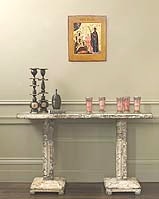
Click to see bigger image 
Click to see bigger image
Bigger Images are visible here: |
Age: |
Price: |
|
Size: cm 26 x 31 |
|
Nr.P7 |
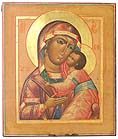 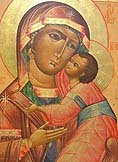 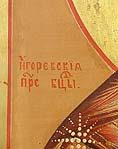  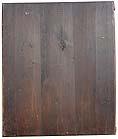 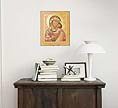 |
Fine Old Icon "Oumilenie Mother of God" - also known as Eleousa (from greek) -
Yaroslavl School - Period late 18th Century 1780 circa -
Icon of good quality almost certainly made by a master painter -
The painting represents the "Eleousa Mother of God" (meaning Merciful) in this variant signed Igorevskaya
On most icons of Eleousa Mother of God the child is painted on left side - In this edition the child is painted on right side, like to remember the Virgin of Khlinov in shoulder length - The icon of Oumilenie Mother of God, also known as Eleousa, is considered one of the most touching and attractive image depicting
the Mother caressing her child, like in the most versions of the Vergin of Vladimir -
The main distinctive
feature of this particular iconography is that the
Jesus Child has his face pressed against the
cheek of the Virgin and one arm around her neck -
The name Oumilenie (russian) derives from the greek word Eleousa - The icon depicts the Virgin Mary admiring the Child who usually, in Eleousa or Oumilenie icons, is seen with his cheek pressed to his mother's, and embracing her. The popularity of this type was promoted by a miracle-working Eleousa icon brought from Constantinople to Vyshgorod near Kiev in the early 12th century. In 1155 Prince Andriy Bogolyubsky transferred it to Vladimir city and the icon eventually came to be known as the Virgin of Vladimir. Due to its outstanding artistic merits it became a palladium of the Russian state, and legends concerning its miracles were widespread
Many copies of it were made.Though the Ukrainian icon from the village of Dorosyni belongs to the same Eleousa type it has nevertheless a number of significant original features: the Child is painted in the right part of the composition (while in the Virgin of Vladimir, the child is on the left) as in Hodigitria type icons. The artist also created an unusual image of the Mother of God. Her face has an air of artless innocence and bears an expression of defenselessness, deeply moving in the light of the sufferings in store for her and her Child -
Icon painted with egg tempera on Gold leaf applied on wood panel -
High quality school painting -
Very good original condition -
Icon is painted with predominant use of ochre colour and red bordeaux,
some green and various yellow tone nuances obtained with the Gold leaf of the background
-
Some old minor restoration on small area - 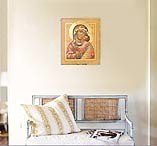
Click to see bigger image
Bigger Images are visible here:  . . . .

Eleousa 16th Century - Eleousa 15th Century
|
Age: |
Price: |
|
Size : cm 36 x 42 |
|
Nr.P8 |
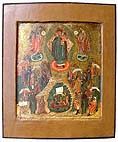  
 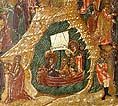 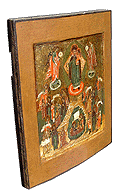 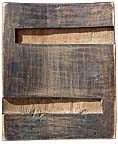 |
Old Russian Icon Mother of God of
Joy to All Who Sorrow - Russian workshop of Kaluga Gubernia region - Period late 17th century 1680/1690 - This first type of icon appeared in Russia in 1688 -
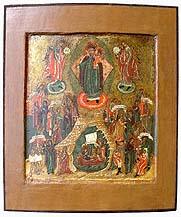
The Virgin is flanked by Angels with poor and sick people asking for help in their needs -
Mother of God and an Angel are in the ship below as guard of sailors -
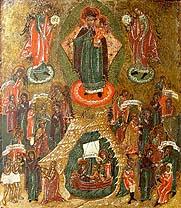
The prayer for asking hers help is this:
"O Mistress, help us by having mercy on us,
hurry to our help for we are perishing from
the multitude of our sins; do not turn your
servants away empty, for you are the only hope we have" 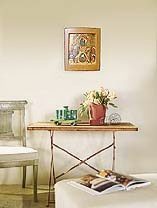
Click to see bigger image
Bigger Images are visible here: |
Age: late |
Price: |
|
Size: cm 26,5 x 31 |
|
Nr.P9 |
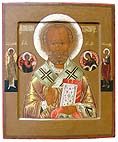 Extra Large Photo   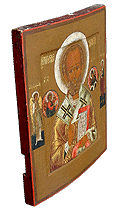 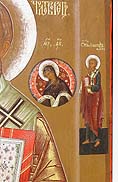 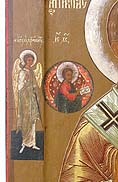 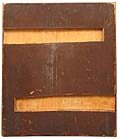 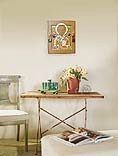 |
Superb Important Icon "Saint Nicholas" the Miracle worker - Mstera School late 18th Century - 1780 circa - Icon of good quality over Gold and silver leaf on wood panel - good state of conservation - two wood splines on the back - Kovcheg (raised border) - The painting represents St. Nicholas with the miracle of Nikiisk - Jesus Christ and the Virgin Mary beside - On the borders two Saint Protectors: the Guardian Angel and Saint Jacob brother of God - Icon with miraculous powers! 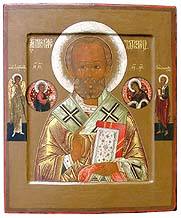
Click the photo to see bigger image Saint Nicholas is venerated in the East as miracle worker and in the West as patron of a great variety of persons - children, mariners, bankers, pawn-brokers, scholars, orphans, laborers, travelers, merchants, judges, paupers, marriageable maidens, students, children, sailors, victims of judicial mistakes, captives, perfumers, lowyers - He is known as the friend and protector of all in trouble or need - The remains of St. Nicholas now repose principally in Bari, Italy, having been transported there in 1087 A.D. after Myra (now Demre, Turkey) fell to Islamic invaders - A fragrant liquid called "myrrh" still exudes from the relics - Miracles are performed even today through the intercessions of St. Nicholas - 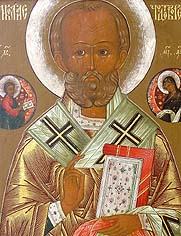
Click the photo to see bigger image
Mstera iconographers were famous for their masterly painting in the ancient manner -
A very indicative feature (a secret technique of Mstera) is the gluing of gold leaf threads
to the basement of melted garlic juice (which is called assist) -
The icon painted by an individual order - The borders depict a Guardian Angel and
St. Jacob the Brother of God - Very good state of preservation -
Highest level of painting with Gold and Silver leaf decorations -
A rare collection piece - This icon is a real artwork of russian Iconography
and has a museum and collection significance
- Size: cm 26 x 31 (10¼" x 12¼" inches)
- 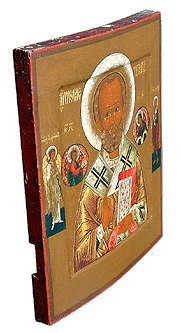 Click the photo to see bigger image  Click to see bigger image Click to see bigger image
Bigger Images are visible here: |
Age: late |
Price: |
|
Size: cm 26 x 31 |
|
Nr.P10 |
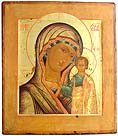 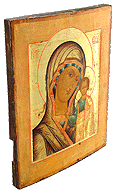 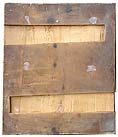 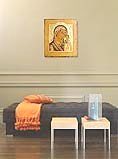  |
Old Icon Kazan Mother of God -
Moscow School middle 18th Century 1760 circa -
Handpainted with egg tempera on Gold leaf over convas applied on wood panel -
Mother of God with Child - The Kazan icon is related to the iconographical
type of hymn in praise of the Virgin, known as
the Odigitry icon ( from Greek it means "guide")
This icon
depicts the Virgin in half-.length with the
blessing God-Child. In Byzantium, this iconography
was related to the Vlakherin icon of the Virgin.
In Russia, the icon was named after Kazan,
the place of a miraculous occurrence on July 8, 1579.
Prince Dmitry Pozharsky freed Moscow holding
the Kazan icon of the Virgin on October 22, 1612.
The church celebration of the icon occurs on these
two days -
The Virgin of Kazan was considered the
protectress of all Russia -
Icon made in old russian traditions of 18th century - Kovcheg (raised border) -
Handpainted with egg tempera over Gold leaf applied on canvas
and finally on wood panel -
The Gold leaf
on canvas is a more refined and expensive technique than
the gild method applied directly on wood panel -
two hollows on the back -
Icon is painted with ochre, red, green and in various tones -
Good state of preservation with some small old restoration
- Size: cm 31 x 35,5 (12¼" x 14" inches) -  Click to see bigger image 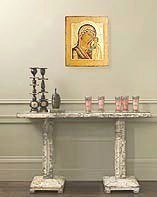
Click to see bigger image
Bigger Images are visible here: |
Age: |
Price: |
|
Size: cm 31 x 35,5 |
|
Nr.P11 |
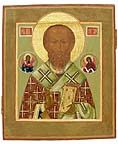  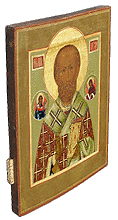 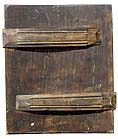 |
Old Icon "Saint Nicholas" the Miracleworker - Yaroslavl School early 19th Century - 1800/1830 circa - Icon of good quality on Gold leaf over wood panel - good state of conservation - Kovcheg (raised border) - Two wood splines on the back - 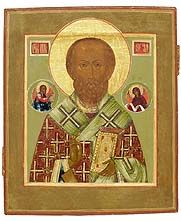 Saint Nicholas is venerated in the East as miracle worker and in the West as patron of a great variety of persons - children, mariners, bankers, pawn-brokers, scholars, orphans, laborers, travelers, merchants, judges, paupers, marriageable maidens, students, children, sailors, victims of judicial mistakes, captives, perfumers, lowyers - He is known as the friend and protector of all in trouble or need - The remains of St. Nicholas now repose principally in BARI, Italy, having been transported there in 1087 A.D. after Myra (now Demre, Turkey) fell to Islamic invaders - A fragrant liquid called "myrrh" still exudes from the relics - Miracles are performed even today through the intercessions of St. Nicholas - 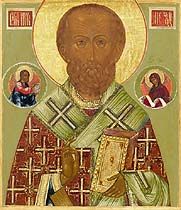
The painting represents St. Nicholas with the miracle of Nikiisk -
Jesus Christ and the Virgin Mary beside -
Yaroslavl was famous for the iconography art made with old
russian tradition -
Icon painted by an individual order - Good state of preservation with some small
old restoration -
Very good level of painting with several Gild leaf decorations
- Size: cm 26 x 31 (10¼" x 12" inches)
- 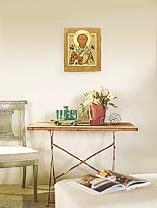
Click to see bigger image
Bigger Images are visible here: |
Age: early |
Price: |
|
Size: cm 26 x 31 |
|
Nr.P12 |
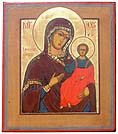 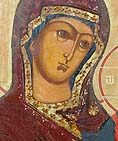 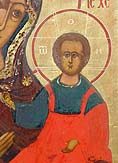 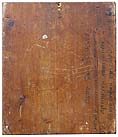 |
Old Russian Icon Virgin of Smolensk - Tver School - Period middle19th Century 1840 circa - The most stern and solemn variant of the Virgin Hodegetria - Its chief distinction from an Iconography point of view is that the Christ-Child is depicted full face - 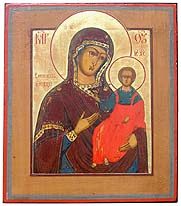

Smolenskaya
The legend says it was brought to Russia from
Byzantium, was kept from the 12th century in
the Assumption Cathedral in the city of Smolensk -
In the 15th century the Icon was in Moscow
for a time, but in 1465 it was returned to the
people of Smolensk - The Virgin of
Smolensk became particularly popular in the
16th century 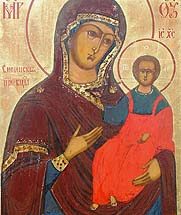 Click to see bigger image Handpainted with egg tempera on Gold leaf over wood panel - Tver Region School (Volga river) - Period middle 19th Century - 1840 circa - 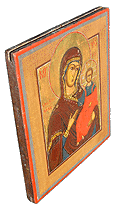 Click to see bigger image Very well painted icon with a characteristic ochra colour, red, red bordeaux, green and in orignal state of conservation with minor old restoration - old cyrillic inscription on the back  Click to see bigger image
On the back icon there is the following cyrillic insription: 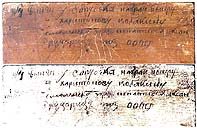 Click to see bigger image
Size: cm 30 x 35,2 (12" x 13¾" inches) - 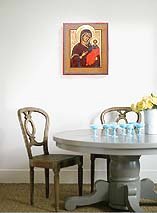
Click to see bigger image
Bigger Images are visible here: |
Age: |
Price: |
|
Size: cm 30 x 35,2 |
|
Nr.P13 |
 Extra Large Photo 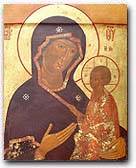 Extra Large Photo 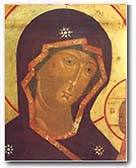 Extra Large Photo 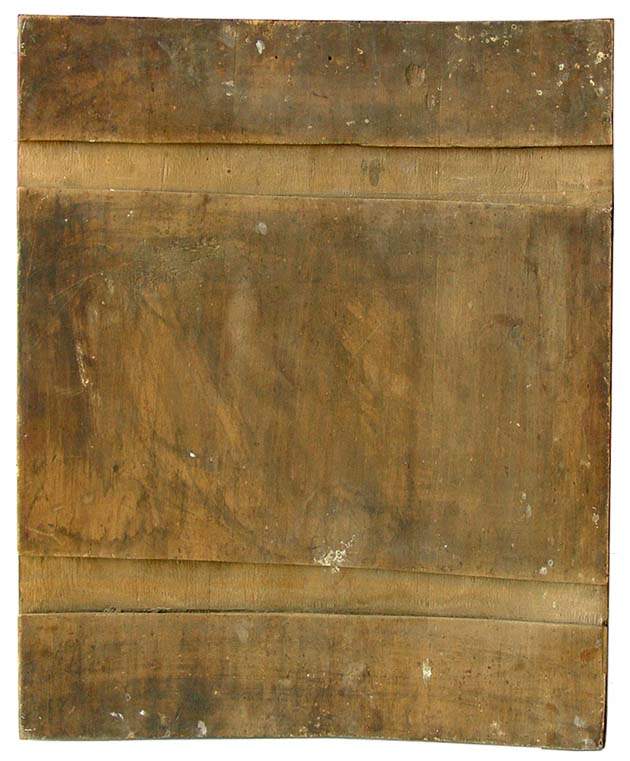 |
A Superb Old Russian Icon depicting the
Mother of God Hodegetria of Tichvin
A large painting iconostasis of Moscow
School middle 17th century 1640/1650 circa - The icon is
painted in an extremely classical style very near
to the Byzantine tradition -
In this monumental church icon Mary, the Mother
of God, wears a deep crimson-purple mantle -
The purple colour alludes to her divine destiny, as
the Mother of Christ - On her forehead and
shoulders are placed three stars representing
her virginity before, during and after Christ's birth
- With her right hand she indicates the
Christ Child who is seated on
her left arm -

Click to see bigger image The child is dressed as a classical philosopher in a mantle decorated with gold lines - With His right hand He makes a benedictory gesture, in His left hand He holds a rolled book scroll - Above His head is His name in Greek: IC XC (Jesus Christ) - Also in Greek to the left and right of Mary's head: MR UÈ (Mother of God) 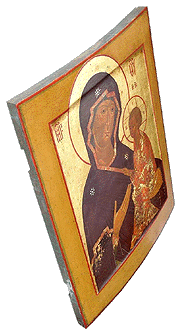
Click to see bigger image
In Russia the Tichvin Mother of God (Tichvinskaia)
is the best-known variation of the Hodegetria prototype -
The most important difference is that the Christ Child
has crossed His right leg beneath His left, revealing
the bare sole of His right foot - According to legend
the original Tichvin Mother of God icon first appeared
in 1383 above Lake Ladoga, from where it floated
through the air to the little town of Tichvin, halting on
the banks of the river Tichvinka - A wooden church was built
on this spot in honour of the icon and a monastery later
founded, in 1560 - Important historical events have been
attributed to the miraculous power of the Tichvinskaia,
in particular the Swedes failed attempt to capture the
monastery in 1613, and the successful peace negotiations
held at Stolbovo in 1617, when Eastern
Karelia were granted to Sweden, and Novgorod returned under
Russian rule - The feast of the Tichvinskaia is celebrated
on 26 June - The icon was honored all along Russia,
especially it was used in cases of children got sick - |
Age: |
Price: |
|
Size: cm 44,5 x 53,5 |
|
Nr.P14 |
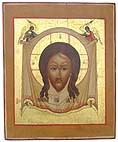
Foto Extra Large 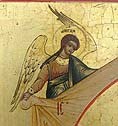 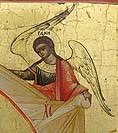 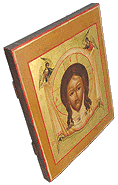 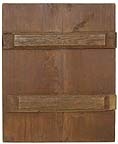 |
Old Rare Mandylion Icon
in the Superb original version of the russian iconography
- St. Petersburg School middle 18th Century 1750/1760 circa -
Very rare and interesting painting on Gold leaf applied over wood panel 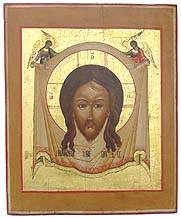 Click the photo to see bigger image 
This icon is also known as "The Sudarium" or Savior
Uncreated by Human Hands (Nerukotvorny Obraz Gospoda Nashego
Isusa Khrista ) - The depiction is inspired
by a legend that Christ’s image remained on a cloth
that He used to wipe His face. Abgar, The King
of Edessa, was suffering from leprosy. Hearing of
the many miracles performed by Jesus Christ, the King sent his archivist
Hannan to look for Jesus to heal him.
As Jesus couldn't come, Hannan tried
to draw him but with no success "because
of the inexpressible glory in his face
which changed in grace."
So Christ got a cloth himself and put
it on his face and his visage were
impressed on the Mandylion 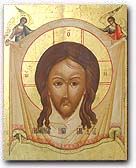 Click the photo to see bigger image As soon as the King saw the Jesus face impressed on the Mandylion, he was healed and became converted. Later the king attached this cloth to a board and placed it on a niche on the gate of the city. Tile was then used as a covering for the cloth and legend says that the image appeared on the tile as well. In the russian iconography of the late 16th and 17th centuries, the painted figures of the Archangels Michael and Gabriel appeared holding up the Mandylion cloth. 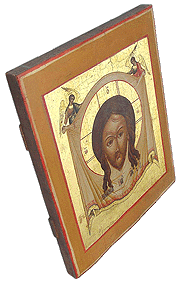 Click the photo to see bigger image
Icon in good condition of conservation
Bigger Images are visible here: |
Age: |
Price: |
|
Size: cm 40,5 x 48,5 |
|
Nr.A1 |
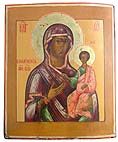 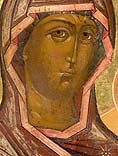 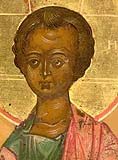 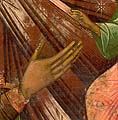 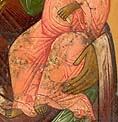 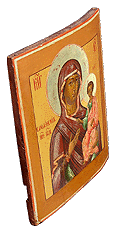 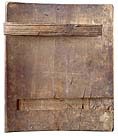 |
Old Russian Icon Virgin of Smolensk - Moscow School - Period early 19th Century 1830 circa - The most stern and solemn variant of the Virgin Hodegetria - Its chief distinction from an Iconography point of view is that the Christ-Child is depicted full face - 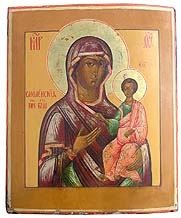

Smolenskaya The legend says it was brought to Russia from Byzantium, was kept from the 12th century in the Assumption Cathedral in the city of Smolensk - In the 15th century the Icon was in Moscow for a time, but in 1465 it was returned to the people of Smolensk - The Virgin of Smolensk became particularly popular in the 16th century - 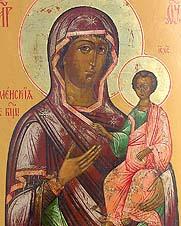
Handpainted with egg tempera on Gold leaf over wood panel - Moscow School early 19th Century 1830 circa - Two hollows on the back - Very well painted icon with a characteristic ochra colour, red, red bordeaux, green and in orignal state of conservation with minor old restoration 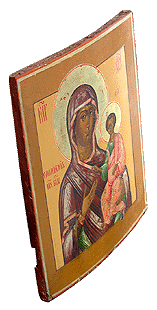
Size: cm 28,8 x 34,5 (11½" x 13¾" inches) -
Payment: Bank Money transfer or International Postal Order |
Age: |
Price: |
|
Size: cm 28,8 x 34,5 |
|
Nr.A2 |
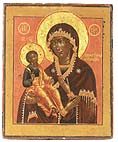 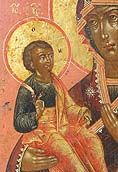 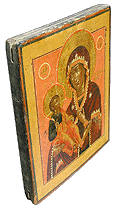  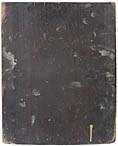 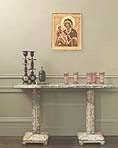  |
Superb Old Icon Troeruchitsa 

Troeruchitsa
In 717, Byzantine Emperor Leo
the Isaurian decided to destroy St. John by defaming him
in the eyes of the Prince of Damascus - The Emperor Leo
commissioned a skilful scribe to forge a letter, ostensibly
sent to him by St. John, with a proposal to capture the
inadequately fortified city of Damascus and forwarded that
letter to the Prince.
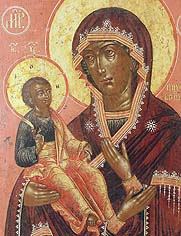
The Prince believed the Emperor's lie
libel and ordered to cut off St. John's hand and exhibit
it in the city's main square as a warning to other traitors -
Some time later, the Prince took pity on St. John and gave
him his cut off hand back - Having received it, St. John fell
on his knees before an icon of the Mother of God and began
to beg Her for a cure - Later, when he fell asleep,
the Mother of God appeared to him in a dream and
told him that his hand had been healed - When he opened
his eyes, he saw his hand was whole sane again, after
which he decided to devote himself to monastic life.

As a token of gratitude for the miracle, St. John made
a silver representation of his hand and attached it over
the Virgin icon image - Since then the icon became
famous and the figure of the Virgin with three hands was
painted in all Russia -
The Icon is painted on Gold leaf applied over wood panel -
various tones of red, green and ochre -
Good state of preservation
- Size: cm 25,5 x 31 (10" x 12½" inches)
- 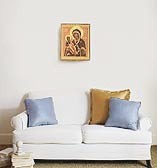
Click to see bigger image 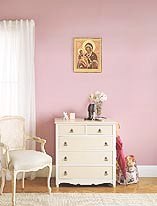 Click to see bigger image
Bigger Images are visible here: |
Age: |
Price: |
|
Size: cm 25,5 x 31 |
|
Nr.A3 |
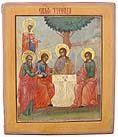 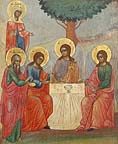 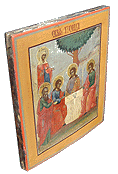 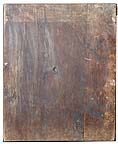 |
Superb Old Icon "Old Testament Trinity" - Moscow School - Period early 19th Century 1830 circa - Here the three Angels who appeared to the Old Testament Prophet Abraham are shown seated at a table - While they are not so identified, many understood them as thus: Christ at center, above him the tree symbolizing the wood of the Cross; God the Father at left and the Holy Spirit on the right - When Abraham was already an old man, God appeared to him "by the oaks of Mamre" in the form of three men or Angels - Abraham and his wife, Sarah, showed them hospitality, slaughtering a calf to cook for them and baking bread. 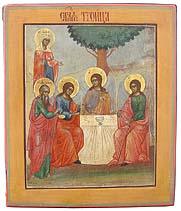
Theologians interpret
these Angels as being the three persons of the Trinity:
God the Father, God the Son and God the Holy Spirit -
The Second Ecumenical Council, held in Constantinople
in 381, affirmed the doctrine of the Holy Trinity, that
God is three persons in one essence -
In Byzantine and Russian icon compositions the
three Angels were depicted seated at a table
with Abraham and Sarah in the shade of an oak-tree with
Abraham's house alongside and hills, or cliffs, in the background - 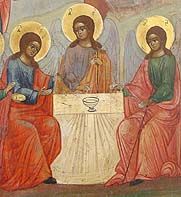 There was frequently also a scene of the calf being slaughtered - A simplified variant icon showed only the three Angels at the table. In the 17th century, interest in the Biblical account grew up and compositions began to include more details which reflected Russian everyday life - 
Icon painted with egg tempera on Gold leaf applied on wood panel - Two splines on top and bottom along the borders -
Very good quality painting -
Icon is painted with a wide use of ochre, red
of various tones and gold nuances - Kovcheg (raised border) -
Good state of preservation and some minor old restoration
- Size: cm 26 x 31 (10¼" x 12¼" inches)
- |
Age: |
Price: |
|
Size : cm 26 x 31 |
|
Nr.A4 |
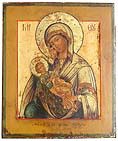 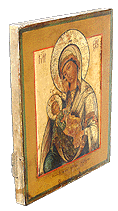  |
Old Russian Icon of Mother of God Remove my Sorrows - Novgorod School middle 18th Century 1750/1760 circa - Here Christ reclines on His mother's knee and holds an open scroll 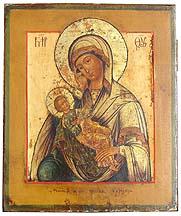

Utoli Moya Pechali
Mary's right hand against her cheek in
the distinct 2 fingered blessing position favored by
the Old Believers - The prototype of the Icon first
revealed its miraculous powers in Moscow, in the year
1640 -
Handpainted Icon with egg tempera over
Gold leaf applied on wood panel - Kovcheg (raised border) -
Very nice quality of painting - Icon in original state
of conservation with some small old restoration -
Size: cm 26,5 x 31 (10½" x 12½" inches) -
Payment: Bank Money transfer or International Postal Order 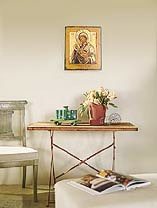
Click to see bigger image
Bigger Images are visible here: |
Age: |
Price: |
|
Size: cm 26,5 x 31 |
|
Nr.A5 |
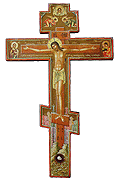 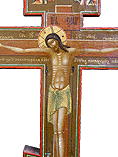 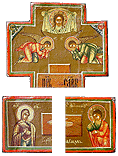  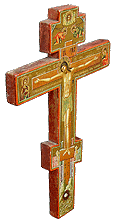 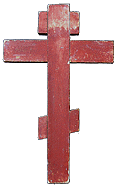 |
Superb old Icon "Crucifixion of Our Lord Jesus
Christ" - The upper part of the Crucifix includes an image of
the Mandylion, the corners are occupied by the sun and the moon,
and two angels with veiled hands bow to receive the soul of the Crucified.
- Palekh School - Period late 18th century
- 1790/1800 circa - Icon painted on wood panel in the form of a cross -
Some parts are covered with Gold leaf -
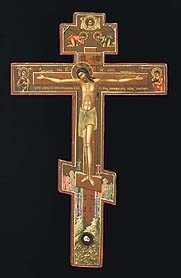
This type of composition makes the icon extremely rare to find -
Hand painted with egg tempera over wood panel -
The shape of the Cross is called - "eight-pointed', i.e.
one vertical and three horizontal beams:
the first upper part is for the sentence title (INRI) -
the second for the hands - On the left side is painted Mary Mother of God -
On the right part there is St. John the forerunner -
The third beam on the bottom is the footboard -
Here are depicted the walls of Jerusalem and on the bottom the Adam's skull -
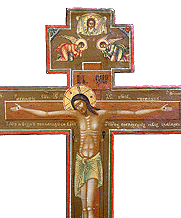
The shape of the Cross was adopted from Byzantium,
while the inclination of the lower beam is a purely
Russian development - In Eastern compositions Christ
is crucified by four nails and not by three as in the Western art -
The Savior is pictured dead with closed eyes or alive with open
eyes, depending on the different moments of the Passion -
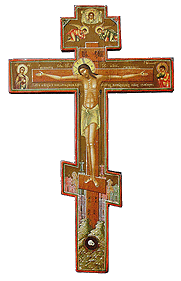
The cross is cm 39,5 height (15" inches) -
The icon is delicately painted with bright colours
in the old russian tradition with ochre, red and blue/green tonalities -
Good original state of preservation |
Age: late |
Price: |
|
Size: cm 24,5 x 40 |
|
Nr.A6 |
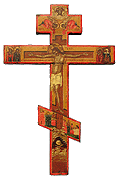 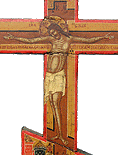  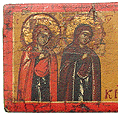
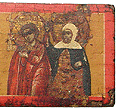  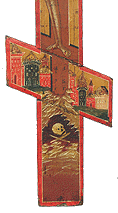 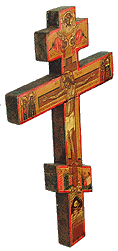 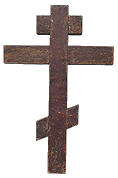 |
Rare old Icon "Crucifixion of Our Lord Jesus
Christ" - On the top part is painted the "Mandylion" with the face
of Jesus - Below there are two Angels - Novgorod School - Period late 18th century
- 1770 circa - Icon painted on wood panel in the form of a cross -
Some parts are covered with Gold leaf -
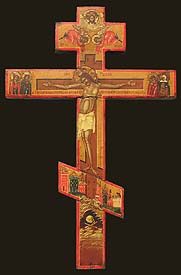
This type of composition makes the icon extremely rare to find -
Hand painted with egg tempera over wood panel -
The shape of the Cross is called - "eight-pointed', i.e.
one vertical and three horizontal beams:
the first upper part is for the sentence title (INRI) -
the second for the hands - On the left side are painted Mary Mother of God and
Mary of Magdala - On the right part there are St. John the forerunner and the
roman Centurion Longinus - The third beam on the bottom is the footboard -
Here are depicted the walls of Jerusalem and on the bottom the Adam's skull -
The shape of the Cross was adopted from Byzantium,
while the inclination of the lower beam is a purely
Russian development - In Eastern compositions Christ
is crucified by four nails and not by three as in the Western art -
The Savior is pictured dead with closed eyes or alive with open
eyes, depending on the different moments of the Passion -
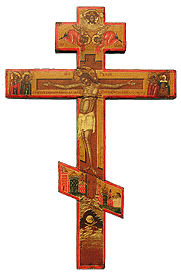
The cross is cm 39,5 height (15" inches) -
The icon is painted
in the old russian tradition with ochre, red and blue/green tonalities -
Good original state of preservation
- Size: cm 26 x 39,5 (10¼" x 15½" inches) -
Provenance: Slava Gallery (USA) |
Age: late |
Price: |
|
Size: cm 26 x 39,5 |
|
Nr.A7 |
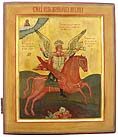 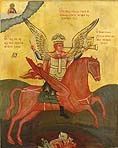 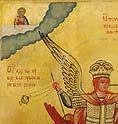 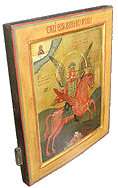 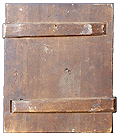 |
Superb Old Icon "Saint Michael Arkhistrategos"
(Chief Captain of the host) - Saint Petersburg School -
Period middle 18th Century 1760 circa - Handpainted with egg tempera over Gold leaf
on wood panel - Two wood splines on the back -
Kovcheg (raised border) - High quality painting -
Here Michael's depiction
is based on the Book of Revelation - He is shown as
the chief captain of the heavenly armies (Greek:Arkhistrategos - russian: Voeveda)
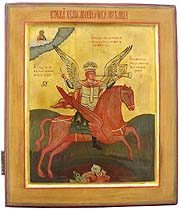 
He sits upon a red winged horse,
wearing a crown and a trump extending to his mouth -
In one hand he holds simultaneously the trumpet bringing the
word of God, a thurible (the incense holder) and a lance to defeat the evil -
In the other hand the book of Gospels -
On the bottom the ruins of Sodom and Gomorrah - On the
top left the image of Christ Immanuel-
The Archangel Michael is associated
both with the visionary destruction in the Apocalypse and
with the Old Testament destruction of Sodom and
Gomorrah -
The Apocalypse of St John shows us the celestial war,
in which Michael and his Angels fight against the dragon
and his demons, a war which continues on earth in the
spiritual combats in which men are assisted by Angels -
The Archangel Michael presides over the struggle against the forces of demons -
Icon in good condition of conservation with some old restoration
- Size: cm 30,5 x 35,5 (12” x 14” inches)
- Payment: Bank Money transfer or International Postal Order |
Age: |
Price: |
|
Size: cm 30,5 x 35,5 |
|
Nr.A8 |
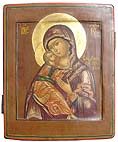 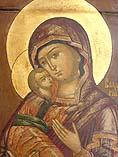 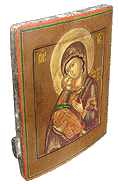 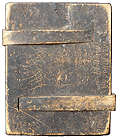 |
Fine Old Icon "Vladimirskaja Mother of God" -
St. Petersburg School - Period middle 18th Century 1740/1750 circa -
Icon of good quality almost certainly made by a master painter -
The painting represents the "Tenderness Mother of God" of Vladimir -
The icon is considered one of the fine subject -
The Mother of God Vladimirskaya is
the most touching and attractive image depicting
the Mother caressing her child
The main distinctive
feature of this particular iconography is that the
Jesus Child has his face pressed against the
cheek of the Virgin and one arm around her neck -
The name of the Icon derives from the long period
during which the original was kept in the city of
Vladimir
According to legend this Icon was painted
by Saint Luke the Evangelist and was kept in Jerusalem,
Constantinople, and finally in Kiev, before
Prince Andrei Bogoliubsky removed it to Vladimir -
The Icon gained a reputation for playing a role
in military victories, particularly for saving
Moscow from attack by Tamerlane (mongolian ruler of Samarkand) -
Icon painted with egg tempera on Gold leaf applied on wood panel -
High quality school painting -
Very good condition -
Icon is painted with predominant use of ochre colour and red bordeaux,
some green and various Yellow tone nuances obtained with the Gold leaf of the background
- Kovcheg (raised border) -
Some old minor restoration on the borders
- Size: cm 26 x 32 (10¼" x 12½" inches) -
Payment: Bank Money transfer or International Postal Order |
Age: |
Price: |
|
Size : cm 26 x 32 |
|
Nr.A9 |
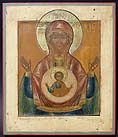 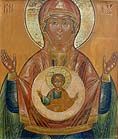 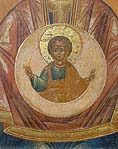 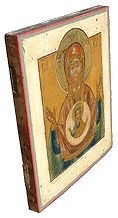 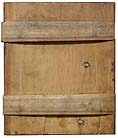 |
Old Russian Icon
"Mother of God of the Sign" also called
the Virgin Orans (praying) or
Great Panagia (from greek "all Saint") -
Superb icon cm 26,6 x 31 (10½" x 12¼" inc) - Novgorod school -
Period middle 18th Century 1760 circa -
Painting with egg tempera on gild leaf -
Icon of good quality almost certainly made by a master painter -
A half-length depiction of the Virgin with raised
hands and Christ-Emmanuel on her chest - Emmanuel
means "God with us" in Hebrew and is the name used
by the prophet Isaiah when writing of the coming
Messiah. This type of Virgin was well-known in Byzantium
and common in early Russia, especially in Novgorod where
a 12th century icon of this type was kept, considered
to be the city's holiest treasure and its protection -
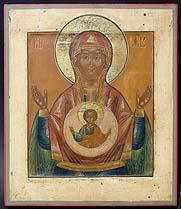

Znamenie
A legend tells that the Novgorod Icon miraculously
saved the city when the men of Suzdal were besieging
it in 1169 - In Russian Iconostases a composition of
the Virgin of the Sign occupied the central position
in the prophets row as a visual expression of the
prophecies about the birth of Christ -
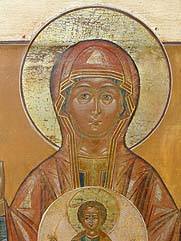
Icon painted with egg tempera on Gilded leaf applied on cypress wood panel -Two wood splines on the back - Kovcheg (raised border)
- High quality school painting -
Icon is painted with predominant use of ochre and cream colours - some decorations
in blue, green and red bordeaux -
Very good condition -  - -

17th Century - - - 18th Century
|
Age: |
Price: |
|
Size : cm 26,6 x 31 |
|
Nr.A10 |
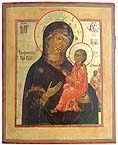 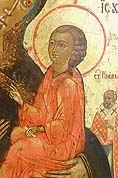  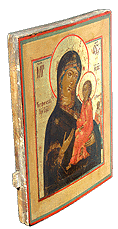 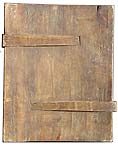 |
Old Russian Icon depicting the Mother of God Hodegetria of Tikhvin - Painting iconostasis of Saint Petersburg School - Period late 18th century 1780 circa - The icon is painted in an extremely classical style very near to the Byzantine tradition - In this monumental church icon Mary, the Mother of God, wears a deep dark crimson-purple mantle - That colour alludes to her divine destiny, as the Mother of Christ - On her forehead and shoulders are placed three stars representing her virginity before, during and after Christ's birth - With her right hand she indicates the Christ Child who is seated on her left arm 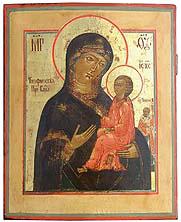

Tikhvinskaya The child is dressed as a classical philosopher in a mantle decorated with gold lines - With His right hand He makes a benedictory gesture, in His left hand He holds a rolled book scroll - Above His head is His name in Greek: IC XC (Jesus Christ) - Also in Greek to the left and right of Mary's head: MR UÈ (Mother of God) 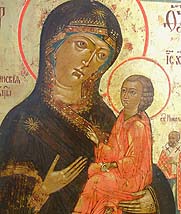
In Russia the Tikhvin Mother of God (Tikhvinskaya) is the best-known variation of the Hodegetria prototype - The most important difference is that the Christ Child has crossed His right leg beneath His left, revealing the bare sole of His right foot 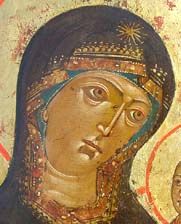
According to legend
the original Tikhvin Mother of God icon first appeared
in 1383 above Lake Ladoga, from where it floated
through the air to the little town of Tikhvin, halting on
the banks of the river Tikhvinka - A wooden church was built
on this spot in honour of the icon and a monastery later
founded, in 1560 - Important historical events have been
attributed to the miraculous power of the Tikhvinskaya,
in particular the Swedes failed attempt to capture the
monastery in 1613, and the successful peace negotiations
held at Stolbovo in 1617, when Eastern
Karelia were granted to Sweden, and Novgorod returned under
Russian rule - The feast of the Tikhvinskaya is celebrated
on 26 June - The icon was honored all along Russia,
especially it was used in cases of children got sick -
Handpainted with egg tempera over wood panel -
Two hollows on back
- St. Petersburg School 1780 circa - Very well painted icon
in orignal state of conservation with some old restoration - On bottom right the Saint protector of the house St. Nicholas -
This icon is a real artwork of Iconography and has a collection significance -
Original state of conservation with some old minor restoration -
Size: cm 30 x 37,5 (12" x 15" inches) -
Payment: Bank Money transfer or International Postal Order 
Virgin of Tikhvin 16th Century
|
Age: |
Price: |
|
Size: cm 30 x 37,5 |
|
Nr.A11 |
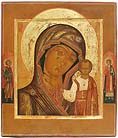  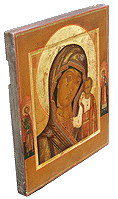 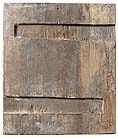 |
Old Icon Kazan Mother of God -
Moscow School late 18th Century 1780/1800 circa -
Handpainted with egg tempera on Gold leaf over wood panel -
Mother of God with Child - Beside two home saint protectors - The Kazan icon is related to the iconographical
type of hymn in praise of the Virgin, known as
the Odigitry icon ( from Greek it means "guide")
This icon
depicts the Virgin in half-.length with the
blessing God-Child. In Byzantium, this iconography
was related to the Vlakherin icon of the Virgin.
In Russia, the icon was named after Kazan,
the place of a miraculous occurrence on July 8, 1579.
Prince Dmitry Pozharsky freed Moscow holding
the Kazan icon of the Virgin on October 22, 1612.
The church celebration of the icon occurs on these
two days -
The Virgin of Kazan was considered the
protectress of all Russia.
Icon made in old russian traditions of 18th century - Kovcheg (raised border) -
Icon is painted with ochre, red, green and in various tones -
Good state of preservation with some small old restoration
- Size: cm 26,5 x 31 (10½" x 12¼" inches)
- |
Age: |
Price: |
|
Size: cm 26,5 x 31 |
|
Nr.A12 |
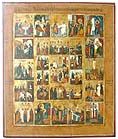 
 
 
 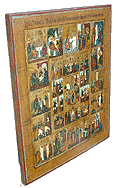 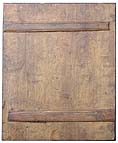 |
Superb Old Russian Icon of "Jesus Christ's Resurrection with 16 Feasts" - The complex central painting with a lot detailed figures on the topic of Passover. In the lower section of the central painting Jesus Christ goes down to the Hell. He stands on the fallen gates of Hell and he grasps the hand of Adam, while Eva is kneeling down to his feet. The Patriarchs, the Prophets and the Saint are out of the jaws of the beast, represented with big red mouth of a monster - Around the central image there are 12 scenes connected with the life of Jesus - 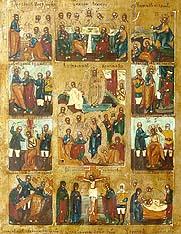 12 central scenes of Jesus Life The 12 central scenes are surrounded by other 16 scenes established by the orthodox Church - In order from left towards right there are: the Old Testament Trinity - the Nativity of Mary - Jesus Christ and God Father - the Virgin Presentation to the Temple - the Annunciation - the Nativity of Christ - the Jesus Presentation to the Temple - the Baptism of Jesus - the Transfiguration - the Entrance in Jerusalem - the resurection of Lazarus - the Assumption of the Virgin Mary - the decapitation of St. John Baptist - Mary with Jesus disciples - the Dormition di Mary - the Exaltation of the Cross - 
For this reason the icon is also named of the16 feasts -
Moscow School - Period
early 19th Century 1800 circa - Nice quality painting -
More than 151 figures individually painted miniature
- Icon painted on Gilt leaf applied over wood panel -
Size cm 44,5 x 53,5 (17½" x 21" inches) -
Icon in good state of conservation -
Payment: Bank Money transfer or International Postal Order |
Age: early 19th |
Price: |
|
Size: cm 44,5 x 53,5 |
|
Nr.A13 |
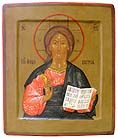 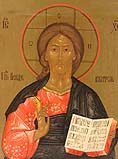 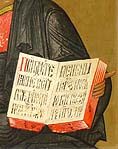 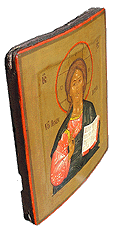 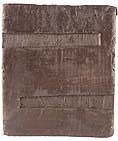 |
Old Icon "Jesus Christ Pantocrator" - Yaroslavl School late 18th Century 1770/1780 circa - Interesting painting on wood panel - Kovcheg (raised border) - Icon of high level, painted in the old 16th Century russian tradition with typical soft colours - The predominant tonalities are the dark ochre of the background, the red-purple of the vest with some yellow-gold decorations and the dark bluish coat - The icon represents Jesus Christ delivering a blessing with his right hand, while in his left hand He holds the book of Gospels open to Matthew 11:27. "Vsya Mnye Predana Buisha Ot Otsa Moego" - All Things are delivered to me by my Father"... 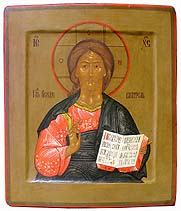
Very fine icon in good condition with some minor old restoration -
Two hollows on the back and two protective splines inserted on
the grooves of the wood borders along the upper and lower part -
On the back, the wood panel shows a dark layer of an old compound treatment
against woodworm
- Size: cm 27 x 31,5 (10½" x 12½" inches)
- |
Age: |
Price: |
|
Size: cm 27 x 31,5 |
|
Nr.A14 |
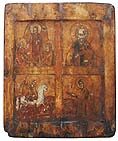 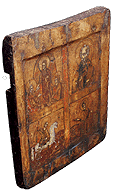 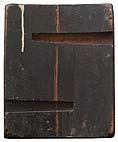 |
Old Icon quadripartite "Jesus Resurrection, St. Nicholas, St. George, Mother of God of Joy for all who suffer" - Russian School Volga region - Period middle 17° century 1640/1650 circa - The icon is very unusual and is in four sections - 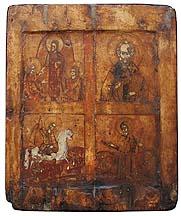
The painting contains 4 subjects: The Jesus Christ Resurrection and Saint Nicholas (top sections),
Saint George and the Mother of God of Joy for all who suffer (bottom sections) -
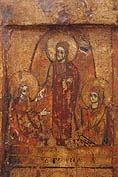
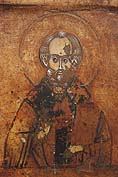 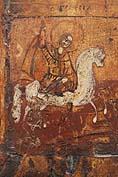
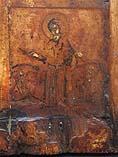
Icon on wood panel with two hollows on the back - Kovcheg (raised border) -
Very old icon middle 17th Century -
Size: cm 25 x 30 (10" x 12" inches) - 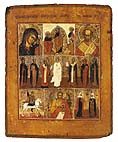 - -
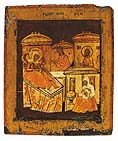
Two icons of 17th Century
|
Age: middle |
Price: |
|
Size: cm 25 x 30 |
|
Nr.A15 |
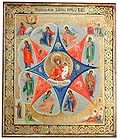

 
 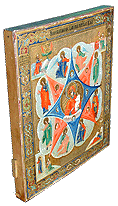 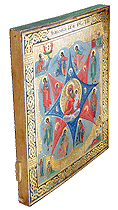 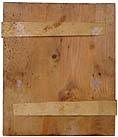 |
Superb Large Old Icon Mother of God of Burning Bush surrounded by Angels -
Palekh School middle 19th Century 1850 circa -
Left upper corner is the vision of Moses the burning
bush on the mountain a Sinai - upper right corner is
the prophet Isaiah's vision of seraphim with burning coal -
lower right corner depicts the ladder of Jacob's vision -
in the lower left corner is the prophet Ezekiel's vision
of the gate to the East
Handpainted over gold leaf on wood panel -
Typical workshop of Palekh with characteristic
polychromatic decorations on the borders -
Size: cm 26,5 x 31 (10½" x 12¼" inches) -
Payment: Bank Money transfer or International Postal Order |
Age: middle |
Price: |
|
Size: cm 26,5 x 31 |
|
Nr.A16 |
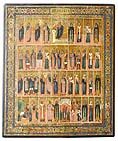 
 
 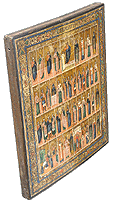 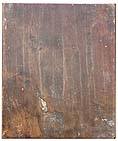 |
Old Icon Menological Calendar Month of December - Russian Icon late19th Century - Calendar Icon of All the Saints of December month - Very fine painting with decorated borders and with miniature details - Moscow School 1860/1870 circa - 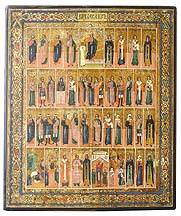
Icon made in traditions of russian iconography -
Handpainted with egg tempera over Gilt leaf on wood panel -
Icon is painted with ochre, green, red and in various tones and Gold nuances -
Good state of preservation
- Size: cm 31 x 35,5 (12½" x 14" inches) - |
Age: |
Price: |
|
Size: cm 31 x 35,5 |
|
Nr.A17 |
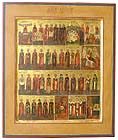 
 
 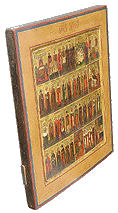 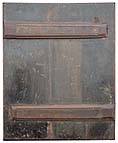 |
Old Icon Menological Calendar Month of August - Russian Icon early 19th Century - Calendar Icon of all the Saints of August month - Very fine painting with miniature details - Moscow School 1800/1820 circa - 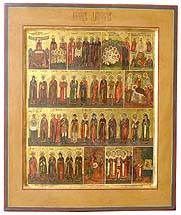 Icon made in traditions of russian iconography - Handpainted with egg tempera over Gold leaf on wood panel - Icon is painted with ochre, green, red and in various tones and Gold nuances - Kovcheg (raised border) - 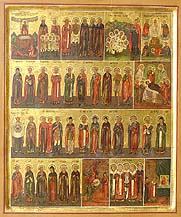
Good state of preservation
- Size: cm cm 37,5 x 44,5 (14¾" x 17½" inches) - |
Age: |
Price: |
|
Size: cm cm 37,5 x 44,5 |
|
Nr.A18 |
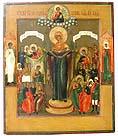 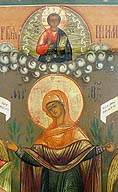 
 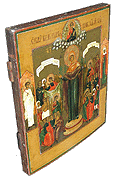 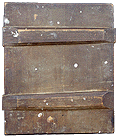 |
Old Russian Icon Mother of God of
Joy to All Who Suffer -
Virgin Mary stands in the center - Suffering humans are gathered
on both sides with Angels among them -
Open scrolls bear petitions of the people -
At central top: the blessing Jesus Christ - On the borders the home's protectors: the Guardian Angel and Saint Pelagia
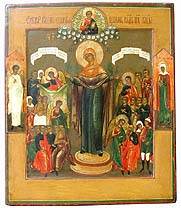
Known in Russia since the 1680s, the iconography of Our
Lady the Joy of All Afflicted emerged under spectacular
influences of several Roman Catholic types. Hence its many
variants, largely differing on many points. They have only
one feature in common - the figures of sufferers praying
to the Virgin, the Protectress interceding for them -
This variant adds to the Virgin figure a crowd of
sufferers divided in two groups with the following attributes:
seniors, the unclothed,
the sick, the afflicted, the hungry and travellers, all
consoled by angels at Her bidding.
Moscow School middle 19th century 1840/1850 circa -
Hand painted with some gold leaf applied
on wood panel -
Icon in good original condition with minor restoration -
Size: cm 26,5 x 31 (10½" x 12" inc) -
Payment: Bank Money transfer or International Postal Order |
Age: middle |
Price: |
|
Size: cm 26,5 x 31 |
|
Nr.A19 |
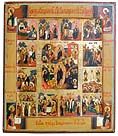 
 
 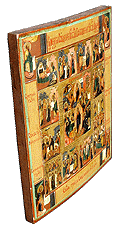 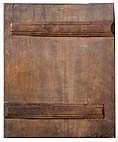 |
Superb Old Russian Icon of Jesus Christ's Resurrection with 12 Feasts - The complex central painting with a lot detailed figures on the topic of Passover. In the lower section of the central painting Jesus Christ goes down to the Hell. He stands on the fallen gates of Hell and he grasps the hand of Adam, while Eva is kneeling down to his feet. 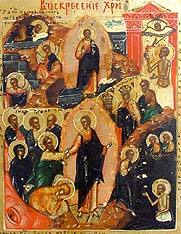 The Patriarchs, the Prophets and the Saint exit from the jaws of the beast, represented with big red mouth of a monster - In the opposite lower corner, Christ saves Peter from the sea waters - Going to the kingdom of skies are depicting the righteous ones like Solomon, David and John the Baptist - Over this scene, Jesus Christ standing up on his empty tomb - 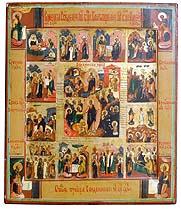
The central panel is surrounded by 12
of the major Church feast days. In order from left towards right
there are: the Nativity of Mary - the Virgin Presentation to the Temple - the
Annunciation - the Nativity of Christ - the Jesus Presentation to the Temple -
the Baptism of Jesus - the Entrance in Jerusalem - the Transfiguration -
the Descent of the Holy Spirit - the Old Testament Trinity - the Exaltation of the Cross
- the Dormition of Mary - On the corners are depicted the 4 evangelists -
Kostroma School (Volga region) - Period late 18th Century 1780/1800 circa -
Two wood splines on the back - Kovcheg (raised border) -
Beautiful scenery icon with over 88 figures- Painting on Gilt leaf -
Size cm 30 x 35,5 (12" x 14" inches) -
In good state of conservation - |
Age: late 18th |
Price: |
|
Size:cm 30 x 35,5 |
|
Nr.A20 |
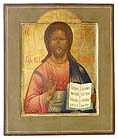 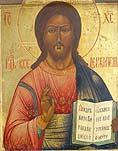 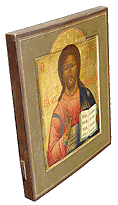  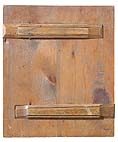 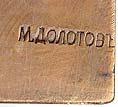 |
Superb Old Icon "Jesus Christ Pantocrator" - Novgorod School late 18th Century 1770/1780 circa - Interesting painting on wood panel with Gold leaf - Kovcheg (raised border) - Icon of high level, painted in the old 16th Century russian tradition with typical soft colours - The predominant tonalities are the pale green of the background, the red-purple of the vest with some yellow-gold decorations and the dark bluish coat - The icon represents Jesus Christ delivering a blessing with his right hand, while in his left hand He holds the book of Gospels open to Matthew 11:27. "Vsya Mnye Predana Buisha Ot Otsa Moego" - All Things are delivered to me by my Father"... 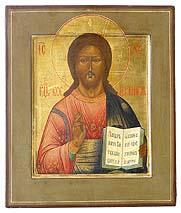
Very fine icon in good condition with some minor old restoration -
Two hollows on the back with two protective splines inserted -
Icon made with high quality wood -
On the back, the wood panel shows a little impressed inscription in cyrillic |
Age: |
Price: |
|
Size: cm 26,5 x 31 |
|
Nr.A21 |
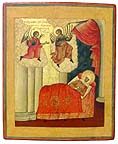    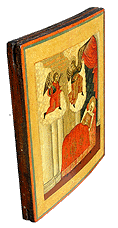 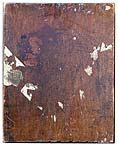 |
Very Rare Icon "The Dormition of St. Anna", the mother of Mary
(mother of God) painted in a house scenery background -
Moscow School late 18th century 1780/1800 circa
- St. Anna reclines in bed as two angels descend from Heaven -
A rare icon subject to find - This is a real artwork of russian Iconography
and has a museum and collection significance -

St Anna, the mother of the Mary ( the Theotokos), was the wife of St Joachim and the daughter of Mattham, a Levi priest.
According to tradition, St. Anna is invoked for conceiving children, and for help in difficult childbirth -
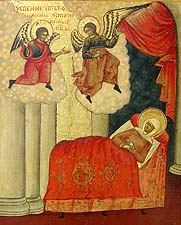
According to Tradition, she died peacefully
in Jerusalem at age of 79, before the Annunciation
to the Most Holy Theotokos -
During the reign of St. Justinian the Emperor
(527-565), a church was built in her
honor at Deutera - Emperor Justinian II
(685-695) restored her church,
since St. Anna had appeared to his pregnant wife -
It was at this time that her body and maphorion (veil)
were transferred to Constantinople -
The Orthodox Church commemorates the dormition of St Anna on 25th of July -
Icon painted on Gold leaf applied over wood panel - In good original condition -
some small old restoration on
the bottom
- Size: cm 28,5 x 33,5 (11¼" x 13¼" inches)
- Payment: Bank Money transfer or
International Postal Order |
Age: late |
Price: |
|
Size: cm 28,5 x 33,5 |
|
Nr.A22 |
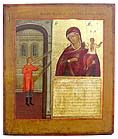   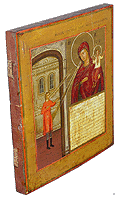 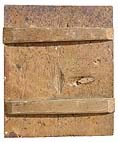 |
Old Russian Icon Mother of God of Unexpected Joy - Saint Petersbourg School - Period late 18th Century 1780/1800 circa - This icon depicts an interior in which a man is standing before a large Icon of the Virgin who holds the child Jesus on her left arm. The child bears the wounds of the crucifixion - On the common icons of this subject, the man is represented "knelt" in front of the Mother of God - In the "standing man" variant is put in evidence the moment in which the icon begins to bleed - 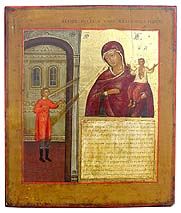 
Unexpected Joy The tale illustrated is this: A certain man who led a sinful life was nonetheless devoted to the Mother of God and daily venerated her Icon, repeating the words of the Archangel Gabrielle's greeting - "Hail Mary, full of grace" - One day he made ready to go and blood began to pour out of them - Falling to the floor the sinner cried out, "O Lady, who has done this?" The image replied: 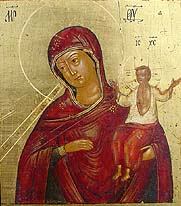
""You and the other sinners who crucify my Son again with your sins"
The sinner repented and was forgiven, so the experience was a great "unexpected joy,"
thus the title of this icon type - The lettered panel seen below the image of the Mother of God provides
the beginning of the tale - Hand painted on gold leaf applied on wood panel - A very fine quality
painting - Icon in good condition -
Size: 25,5 x 30,5 (10" x 12" inc) -
Payment: Bank Money transfer or International Postal Order 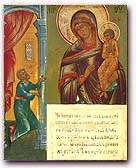
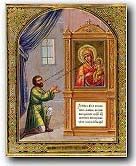
Kneeling Figure Variant
|
Age: late |
Price: |
|
Size: cm 25,5 x 30,5 |
|
Nr.A23 |
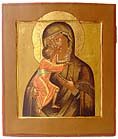 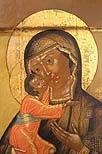 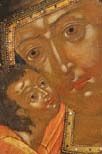  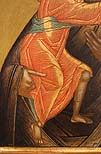 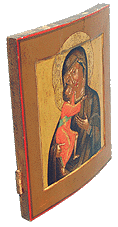 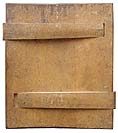 |
Superb Russian Icon Kostroma-Fëodorov Mother of God -
Another tenderness variant, this type being associated
with the House of Romanov as the original Theodore Icon
was carried by the deputation who implored young
Mikhail Romanov to become Tsar of Russia and was
used to bless him upon his ascent to the throne -
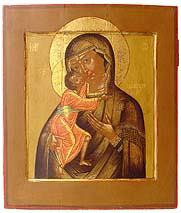

Kostromskaya - Fëodorovskaya
Thus the Fëodorov (know as well as Theodore) Icon became the
patron of the Romanov family - Rare and gorgeous Icon of high quality -
Kostroma School - Period middle 18th Century 1760 circa -
Handpainted with egg tempera on Gold leaf -
Gesso on wood panel - Kovcheg (raised borders) -
High quality of the painting - Inscription in Cyrillic
on the right read: "Holy image of the Fëodorov Mother of God" -
Size: cm 27 x 31 (10½" x 12¼" inches)
- Very good condition -
- Payment: Bank Money transfer or
International Postal Order 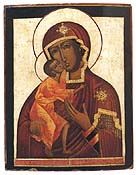
Virgin of Kostroma-Fëodorov 17th Century
|
Age: middle |
Price: |
|
Size: cm 27 x 31 |
To see the items for sale click one of the galleries
 €uro currency is the main quotation - US $
may fluctuate according to the Currency Converter
€uro currency is the main quotation - US $
may fluctuate according to the Currency Converter
![]()